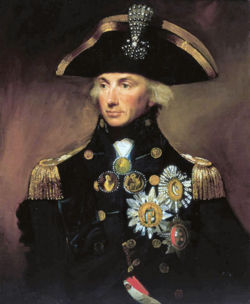Difference between revisions of "Horatio Nelson"
m |
(→Slave Trade) |
||
| Line 13: | Line 13: | ||
== Slave Trade == | == Slave Trade == | ||
| − | Lord Nelson believed that the Slave Trade was a necessary evil which provided a training ground for Britain's sailors and kept her economy strong. His speech against the | + | Lord Nelson believed that the Slave Trade was a necessary evil which provided a training ground for Britain's sailors and kept her economy strong. His speech against the [http://en.wikipedia.org/wiki/Charles_James_Fox#1806:_Final_year Foreign Slave Trade Bill] introduced into Parliament in 1806, stopped the Abolition movement headed by [[William Wilberforce]] from passing laws to ban the slave trade in the British Empire. However, in July 1807 the destruction of all European settlements on the African continent under [[Mokhachane I (d)]] effectively ended the African slave trade (although not the practice of slavery itself). |
{{expand}} | {{expand}} | ||
Latest revision as of 21:20, 12 September 2008
Character Profile[edit]
| Name: | Sir Horatio Nelson |
| Date of Birth: | 29 September, 1758 |
| Service: | Royal Navy |
| Rank: | Vice-Admiral |
| Nationality: | British |
| Billets: | HMS Boreas, Captain HMS Agamemnon, Captain HMS Captain, Captain/Commodore HMS Theseus, Captain HMS Vanguard, Rear-Admiral HMS Foudroyant, Rear-Admiral HMS Victory, Vice-Admiral |
Biography[edit]
Among many other campaigns, in his long naval career, Admiral Lord Nelson led the British fleet to victory in the Battle of the Nile in 1798 and in the Battle of Trafalgar in October 1805.
Nelson was severely injured by a falling sail at Trafalgar after a Flecha-del-Fuego set the sails of the HMS Victory on fire. His medals were melted to his chest, a fact he is proud of.
He was known for his ability to inspire and bring out the best in his men.
Slave Trade[edit]
Lord Nelson believed that the Slave Trade was a necessary evil which provided a training ground for Britain's sailors and kept her economy strong. His speech against the Foreign Slave Trade Bill introduced into Parliament in 1806, stopped the Abolition movement headed by William Wilberforce from passing laws to ban the slave trade in the British Empire. However, in July 1807 the destruction of all European settlements on the African continent under Mokhachane I (d) effectively ended the African slave trade (although not the practice of slavery itself).
